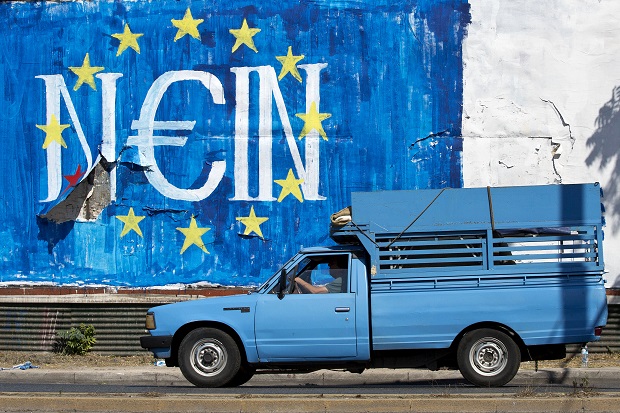
A man drives his van past a graffiti made by street artist N_Grams that read ”NO” in German but also ”YES, IN” in Greek language in Athens, on Sunday, June 28, 2015. Greece’s parliament voted early Sunday in favor of Prime Minister Alexis Tsipras’ motion to hold a July 5 referendum on creditor proposals for reforms in exchange for loans. AP
ATHENS, Greece — Greece’s five-year financial crisis took its most dramatic turn to date Sunday, with the prime minister announcing Greek banks would remain shut indefinitely and restrictions would be imposed on cash withdrawals.
The decision came on the recommendation of the Bank of Greece, Prime Minister Alexis Tsipras said during a televised address to the nation. He didn’t immediately say what types of capital controls would be imposed.
The developments have thrown into question Greece’s financial future and continued membership in the 19-nation shared euro currency — and even the European Union.
For the past two days, Greeks have been rushing to ATMs to withdraw money across the country following Tsipras’ sudden weekend decision to call a referendum on creditor proposals for Greek reforms in return for vital bailout funds.
The government is urging Greeks to vote against the proposals, arguing that they are humiliating and that they would prolong the country’s financial woes.
The referendum decision, which was ratified by parliament after a marathon 13-hour session that ended in the early hours of Sunday, shocked and angered Greece’s European partners. The country’s negotiations with its European creditors have been suspended, with both sides accusing each other of being responsible.
Earlier Sunday, the European Central Bank decided not to increase the amount of emergency liquidity the lenders can access from the central bank — meaning they have no way to replenish fast diminishing deposits.
“It is now more than clear that this decision has no other aim than to blackmail the will of the Greek people and prevent the smooth democratic process of the referendum,” Tsipras said.
“They will not succeed. These moves will have the exact opposite effect. They will make the Greek people more determined in their choice to reject the unacceptable … proposals and ultimatums of the creditors,” he said.
The referendum is set for next Sunday. But Greece’s current bailout expires on Tuesday, and the 7.2 billion euros ($8 billion) remaining in it will no longer be available to Greece after that date.
Without those funds, Greece is unlikely to be able to pay a 1.6 billion-euro ($1.79 billion) International Monetary Fund debt repayment due the same day.
Tsipras said he had renewed a request for the bailout to be extended by a few days to allow for the referendum — a request which was rebuffed during the weekend by Greece’s European creditors.
Tsipras gave no details of how long banks will remain closed or what restrictions will be placed on transactions. Two financial sector officials said the banks would likely remain shut for several days, and the Athens Stock Exchange would also not open on Monday.
Some European officials called for renewed efforts by both sides.
“We don’t know — none of us — the consequences of an exit from the Eurozone, either on the political or economic front. We must do everything so that Greece stays in the Eurozone,” French Prime Minister Manuel Valls told France’s i-Tele TV earlier Sunday.
“But doing everything, that means respecting Greece and democracy, but it’s also about respecting European rules. So Greece needs to come back to the negotiating table,” he said.
On the streets of Athens, reactions to Tsipras’ referendum call were mixed.
“I have no idea what we are voting for. Yes or no, we don’t know what to say,” 67-year-old Triandafila Bourbourda said as she walked in the capital’s main Syntagma Square. “I think we shouldn’t have gone so far to get into this mess.”
But Voula Lambrou, attending a Sunday morning church service, said she believed Greece would be better off outside the 28-nation EU.
“If we exit the European Union, I believe things will be very good for Greece,” she said. “It will be tough for some time, but we will be able to find strength in order to carry on ahead. We don’t need the Europeans.”
Two opinion polls published Sunday indicated that more Greeks want to stay in the Eurozone and make a deal with creditors than want a rupture with the country’s European partners. Both polls were conducted before Tsipras’ referendum call, but they provide an indication of public sentiment.
In the poll by Alco for the Proto Thema paper, 57 percent said they believed Greece should make a deal while 29 percent wanted a rupture of ties. A Kapa Research poll for To Vima newspaper found that 47.2 percent would vote in favor of a new, painful agreement with Greece’s creditors, compared to 33 percent who would vote no and 18.4 percent undecided.
Both polls were conducted from June 24-26 and had a margin of error of about 3.1 percent.
On the banking front, the ECB has said it could reconsider its decision on credit levels.
“We continue to work closely with the Bank of Greece and we strongly endorse the commitment of member states in pledging to take action to address the fragilities of euro-area economies,” ECB chief Mario Draghi said.
Yannis Stournaras, governor of the Bank of Greece, said the bank would “take all measures necessary to ensure financial stability for Greek citizens in these difficult circumstances.”

